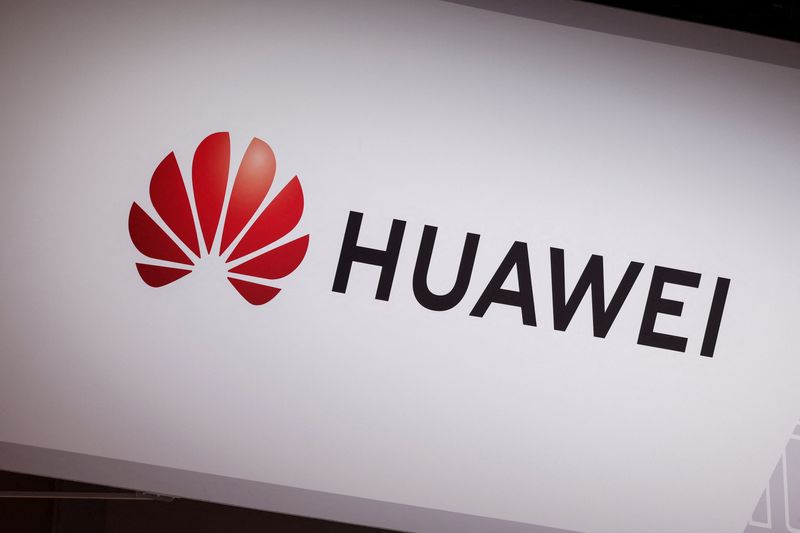By Josh Ye
HONG KONG (Reuters) - U.S. measures to limit the export of advanced artificial intelligence (AI) chips to China may create an opening for Huawei Technologies to expand in its $7 billion home market as the curbs force Nvidia (NASDAQ:NVDA) to retreat, analysts say.
While Nvidia has historically been the leading provider of AI chips in China with a market share exceeding 90%, Chinese firms including Huawei have been developing their own versions of Nvidia’s best-selling chips, including the A100 and the H100 graphics processing units (GPU).
Huawei's Ascend AI chips are comparable to Nvidia's in terms of raw computing power, analysts and some AI firms such as China's iFlyTek say, but they still lag behind in performance.
Jiang Yifan, chief market analyst at brokerage Guotai Junan Securities, said another key limiting factor for Chinese firms was the reliance of most projects on Nvidia's chips and software ecosystem, but that could change with the U.S. restrictions.
"This U.S. move, in my opinion, is actually giving Huawei's Ascend chips a huge gift," Jiang said in a post on his social media Weibo (NASDAQ:WB) account.
This opportunity, however, comes with several challenges.
Many cutting edge AI projects are built with CUDA, a popular programming architecture Nvidia has pioneered, which has in turn given rise to a massive global ecosystem that has become capable of training highly sophisticated AI models such as OpenAI's GPT-4.
Huawei own version is called CANN, and analysts say it is much more limited in terms of the AI models it is capable of training, meaning that Huawei's chips are far from a plug-and-play substitute for Nvidia.
Woz Ahmed, a former chip design executive turned consultant, said that for Huawei to win Chinese clients from Nvidia, it must replicate the ecosystem Nvidia created, including supporting clients to move their data and models to Huawei's own platform.
Intellectual property rights are also a problem, as many U.S. firms already hold key patents for GPUs, Ahmed said.
"To get something that's in the ballpark, it is 5 or 10 years," he added.
Huawei and Nvidia did not immediately respond to Reuters' requests for comment.
COMPUTING POWER
If Huawei manages to grab Nvidia's market share, it could claim another victory against the United States, which has targeted the firm with export controls since 2019.
Huawei rolled out the first Ascend GPUs that year and it is one of a number of products - such as its Harmony operating system - that the company says are entirely homegrown.
Over the past year, the telecoms giant has shown signs that it is beating back against the U.S. curbs by unveiling an advanced smartphone chip and making claims of breakthroughs in chip design tools.
It has also set its sights on becoming a key provider of computing power for AI, with Chief Financial Officer Meng Wanzhou saying last month that Huawei wanted to build a computing base for China and give the world a "second option", in a veiled reference to dominant provider the United States.
Huawei's partners in China so far include iFlyTek, a leading Chinese AI software company which is using the Ascend 910 to train its AI models. IFlyTek was also blacklisted by the United States in 2019.
On Thursday, during iFlyTek's earnings call, Senior Vice President Jiang Tao said the Ascend 910B's capabilities were "comparable to Nvidia's A100" and announced that it was developing a general-purpose AI infrastructure in China alongside Huawei.
"Our partnership now aims to enable domestically developed LLMs to be built with both homegrown hardware and software technology," Jiang said.
Other partners include state-owned software firms Tsinghua Tongfang and Digital China. At a conference in July, Huawei said its AI chips now help power more than 30 large language models (LLM) in China, which is going through a generative AI craze and currently has more than 130 LLMs.
Charlie Chai, an analyst with 86Research, said Nvidia's ecosystem dominance was not "an insurmountable obstacle if domestic players are given sufficient time and a big customer base".

China's self-sufficiency push, which has been championed by President Xi Jinping, is likely to aid this. "In short, a small disruption to near-term supplies, but a big boost to the long-term self-sufficiency agenda," Chai added.
($1 = $1.0000)